
Theatre Royal, Margate worker and former Thanet College student Rachael Emma Anderson grew up in Cliftonville.
Here The Granny Who Rocks blog writer looks at the issue of litter and rubbish in Margate:

On a recent holiday to Corfu, I was shocked by the amount of rubbish visible on the islands shores. Returning to Margate, I soon discovered that alongside beautiful beaches and sunsets, Margate shares another similarity with the Grecian Isle. Here I examine the waste crisis leading from Corfu to the Margate shore.
I have recently returned from a holiday in Corfu, I went with my daughter, flying with EasyJet and staying in an all-inclusive hotel. The weather was beautiful, averaging around 31 degrees, the hotel was clean, and the food was good.
The road to Perama, where our hotel was situated, is of two contrasts, on one side sits a breath- taking view of the Ionian Sea and mountains, turquoise water twinkle in the sun and distant peaks appear to reach up beyond the vivid blue sky. On the other side, holiday complexes make frequent appearances, carved deep into the mountains, reached by paths that work their way up to the dizzy heights of the hotels facilities. Exotic flowers drape themselves along their walls.
Alongside these impressive fetes of architectural engineering and scenes of breath-taking beauty however is another side to the path to Perama, a younger, uglier side than the two just mentioned. This is the side that people try to ignore, the side they try to push under the golden carpet of its shores. Her name is Skoupida, translated in English as ‘Rubbish’.
Skoupida sits, brazen, along the road sides, perched beside historical monuments, languishing upon the sandy shores of beaches. She sits, stacked, in vast plastic containers, containers unable to contain the voluptuousness of her form. Her fetid waste overflows; she spews out plastic bags that glint beneath the Grecian sun. Old deckchairs and used nappies speak her name. it appears that Skoupida has no shame.
The Tembloni sanitary landfill site, the rightful home of Skoupida, is situated in the centre of the island, but this landfill site is now nearing its capacity, unable to cope with any more rubbish. The village located near to the site has been protesting, blocking off the entrance to the site every couple of months, during the summer season, due to the odours given off. There is a new landfill site in Lefkimi, to the south of the island, but this has also been subject to great opposition and protests. Unsurprisingly, there is a natural dislike of having a waste site visible from homes, and a fear of the impact that their close-proximity will have on tourists that feed the economic climate of their land.
As to recycling, the ‘Recycling Company of Greece’ has its own collection vehicles for recyclables, e.g. paper, cardboard, glass and plastic, collected in a mixed form. Yet the system is said to be poor due to the infrastructure not yet being in place for regular collections from villages and rural areas.
So now, let us travel back to Margate.
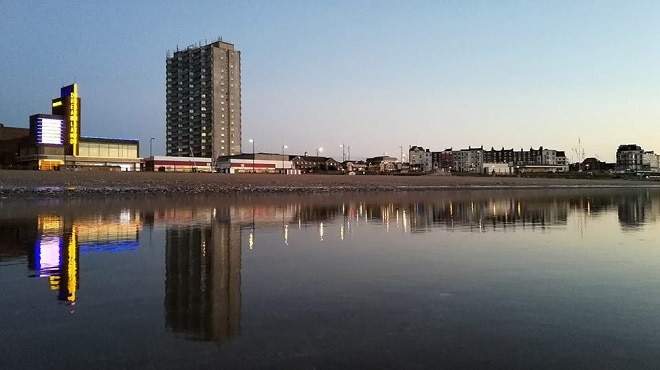
Unlike Corfu, people no longer fly to our island (well apart from the odd helicopter). Manston airport has been silent for a few years now, waiting in anticipation for its next chapter to begin. The train is a popular method of travel, offering an effective high- speed service and links to international stations serving Europe. Some visitors still drive.
Those arriving by train approach the town, as in Corfu, witnessing two stark contrasts. On one side of their approach to the town is a seemingly endless beach of golden sands and an enticing sea and on the other, a brutalist 70’s tower block, Dreamland and a row of brightly lit up amusement arcades.
When I first planned this article, I wanted this to be where the similarities between Corfu and Margate ended, I wanted this article to be about the promotion of Margate and staycations and the vilification of holiday resorts such as Corfu and its problem with waste. Compared to the Grecian Isle that I had recently returned from, I didn’t think that in Margate such a problem existed, but after reaching out to the people that live here, I was proved to be hideously wrong.
Let us start earlier this year.
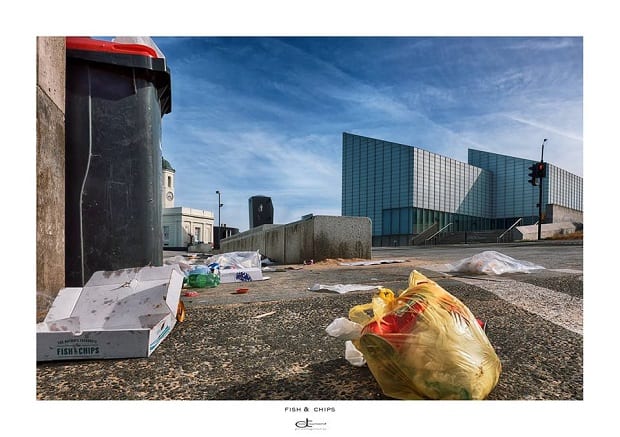
The glorious bank holiday weather that we experienced in England brought crowds flocking to the beaches across the isle – boosting its trade, but alongside this, came a vast amount of rubbish being discarded on Thanet bays and promenades. Thanet District Council reportedly doubled up on their weekend litter picking schedules, but this proved to be an inadequate operation. Bins were filled, some visitors did not even bother with the bins, just leaving their rubbish discarded on the ground. Local people took to social media sites, taking photographs and forwarding them on to local councillors and council in a desperate plea for an increased level of action.
Statistics.
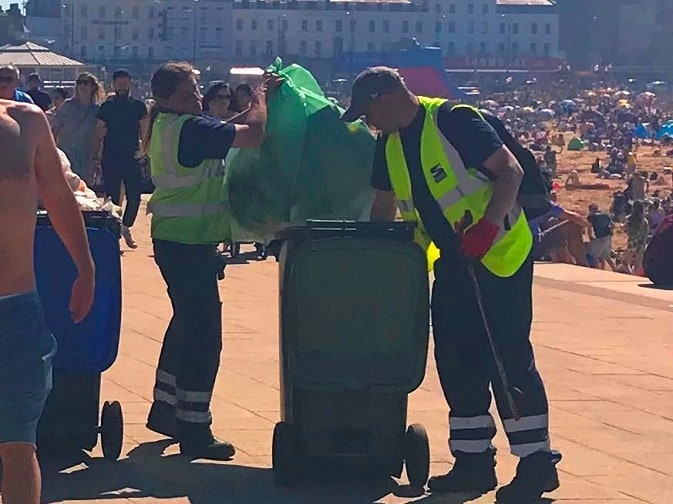
According to Thanet District Councils cleaning department, litter collections from beaches, promenades and streets costs £1.9m per year with council staff collecting over 5,642 tonnes of rubbish. The council state that there are more than 400 bins across the district – around one every 200 feet. These consist of: 52 x large 1100L public bins, 240 x street and dog bins and 120 park dog bins.
There's a rubbish bin… @IsleThanetNews @ThanetCouncil #photography @Fujifilm_UK @FujifilmXLive @FujifilmUS @ExploreKent @BBCEngland @ThanetExtra #landscapephotography #PhotographyIsArt #photooftheday #artistsontwitter @NatGeoPhotos #plastic @NatGeoMag https://t.co/WEGaisECPy pic.twitter.com/HEWxUgay6z
— David Townsend LNPS, ANPS Photographer (@DavidRTownsend) July 7, 2018
Research by ‘Visit Kent’ published at the end of 2016 shows the last collected data (new data due November 2018). Covering 2015, the report shows that during this period 3.9 million trips were undertaken in the area, this consisted of 3.4 million-day trips generating around £119 million and 0.5 million overnight visits generating around £122 million.
Looking closer.
To get closer to the problem, I placed a post on a social media site and the level of responses that I received back was unprecedented and beyond my belief. Message after message came flooding back in response to my thread, messages from people angry, messages from people frustrated, messages from people who felt completely let down by promises made by those in positions of power. And these messages kept on arriving. If you take a walk around this area today you will see large rubbish containers, the same ones as in Greece, overflowing. Discarded furniture sits abandoned on pavements forcing people to walk in the road to get by it.
In context.
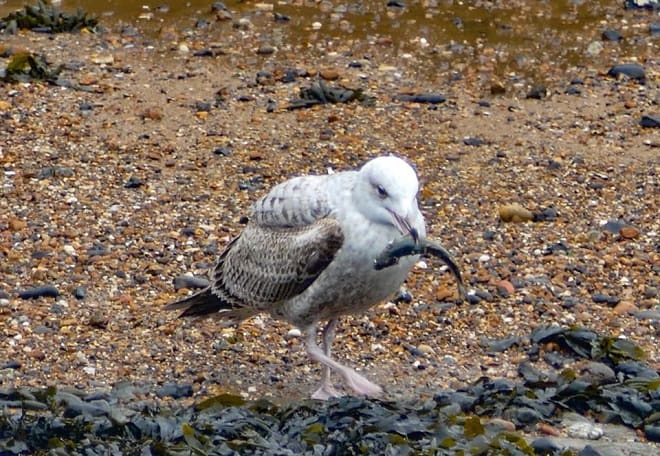
The Herring Gull, omnivorous by nature eating a diet consisting of: carrion, offal, seeds, fruits, young birds, eggs, small mammals, insects and fish, they are a traditional part of seaside environments. But because of the increase in population and the surge of tourists in their natural habitats, both home and abroad, there is a concern about the Gulls moving inland and in their increasing presence in urban areas.
Now, you may argue that Margate is not strictly an urban area, but it is a town with areas of dense population and the RSPB believe that the best approach to understanding urban gull populations starts with comprehensive research regarding the numbers, nesting and foraging habitats of these gulls. This to be followed by the development of effective deterrent methods for use in situations where gulls are causing problems, i.e. in Margate.
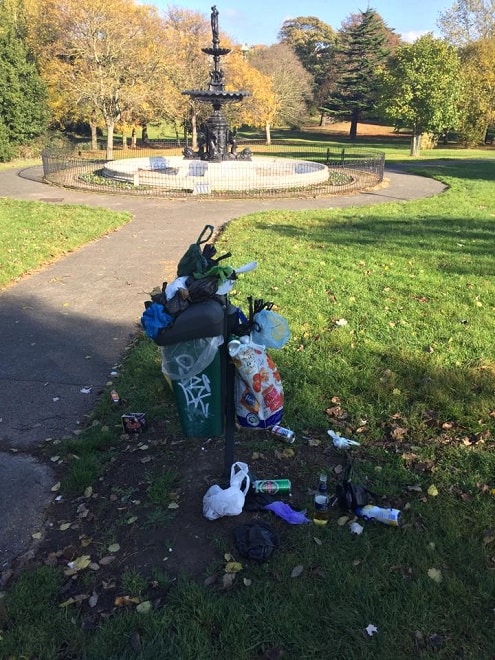
Thanet District Council can lay claim that they have carried out their research and have applied effective deterrent methods by the introduction of seagull proof bags, but this would be widely disputed by residents who claim that this method has proven to be highly inefficient and vastly ineffective due to the poor distribution of the bags and the lack of instruction/education in how to use them effectively.
Residents argue that people new to the area are often unaware of the predatory nature of the gulls and so fail to see the importance of their use. In addition to this, residents say that the bags are not effectively or made available to every household. They say that the bags are often stolen with their replacements costing effort alongside a monetary replacement fee.

One local resident filmed an incident involving a group of seagulls destroying a carrier bag full of rubbish that was placed next to a full up bin situated along Northdown Road in Cliftonville. He described the scene as ‘absolute mayhem!’ going on to describe the incident further: ‘It was also pretty dangerous for motorists. One seagull was hit. Another nearly took a biker out and the loop careered into a few too.’ Another resident stated that: [TDC have an] ‘Environmental responsibility to protect our seas and wildlife. It’s an outrage, let alone a public health and safety violation’ And another, who describes the situation as getting worse, ‘because tourism figures are soaring, but despite the local economy flourishing they’re not countering this with procedures to combat the effects of gentrification, i.e. homelessness, rubbish, more traffic’.
So, what is the solution?
I grew up in Cliftonville at a time when all the hotels and guesthouses in the town were full. The town was alive and vibrant as a popular holiday destination, yet when I walked through the streets I cannot remember having to step over rubbish filled bags littering the pavements. I lived in a nine bedroomed guesthouse and worked during my early teenage years at a large hotel situated in Athelstan Road. Two large Butlins hotels stood guard at one end of my road and my best friend Mandy also lived in a large hotel around the corner in Harold Road. This was multi-occupancy living at its peak, okay, one could argue that these guests were transitory, but the ones that left were soon replaced by others.
Rubbish was never seen; street lights were strung across roads and local resident societies paid for the replacement of bulbs. Street cleaners and refuse men kept the streets clean and clear of rubbish. There were of course seagulls but, in those days, they were just reduced to stealing the occasional sandwich from some unsuspecting holidaymaker’s hand.
Unlike Corfu, Margate holds my past. Bus stops that took my reluctant teenage self to school, cafes where I ate ceclairs and drank Coke from glass bottles and a house on Gordon Road where my Uncle Roger lived. In Corfu my heart ached, it ached for the rubbish tarnishing its beautiful landscape and blowing on its warm breeze but in Margate it is broken and from talking to others I have discovered that I am not alone in the sorrow that I feel.
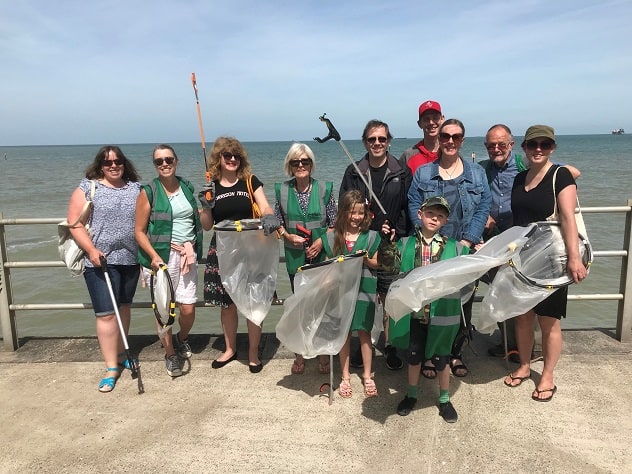
‘ABC’ (A Better Cliftonville) has been fighting the battle of the rubbish for over three years. @filthythanet is a twitter address, that posts photographs from the front line of the streets and there are more, including the groups: ‘Take Pride in Thanet’ and ‘Westgate against Rubbish’. Residents appear to have taken up arms, contacting the local council, councillors and MPs who do not appear to be putting forward or delivering any viable solution.
Residents have taken to the streets themselves, picking up litter and starting up local recycling groups, a vigilante form of approach is now being considered by some, demonstrations and marches by others. An uprising is visible on the Turneresque horizon.
Suggestions for Thanet council
Education – One resident told me they emailed TDC in a plea for a solution to the rubbish problem.and TDC replied stating that officers had tried to educate the residents of Cliftonville but due to the transient nature of the population this was hard. Well, as an educator myself, I would say: ‘Could try harder.’ There is an obvious gap in the guidance, guidance in how individual production can be reduced, guidance in how people can work towards a reduction in their consumption of goods, guidance in how they can shop more conscientiously and recycle more effectively.
Waste Operatives – The overall viewpoint concerning waste operatives is for the need to increase the level of investment in their work and to have their ‘eyes to the ground’ establishing a mind- set of greater responsibility. If rubbish drops out of a rubbish bag/sack, to pick it up and treat it still as rubbish, when emptying bags/sacks into the truck to ensure that the bags are emptied completely and that there is no waste left at the bottom to rot. In addition, if some conscientious citizen has collected a piece of rubbish and placed it in someone else’s bag, to overlook the fact that it may not be bagged correctly or even bagged at all, and to view it as still worthy of collection. To look around the environment in which they work and take a pride and ownership in it.
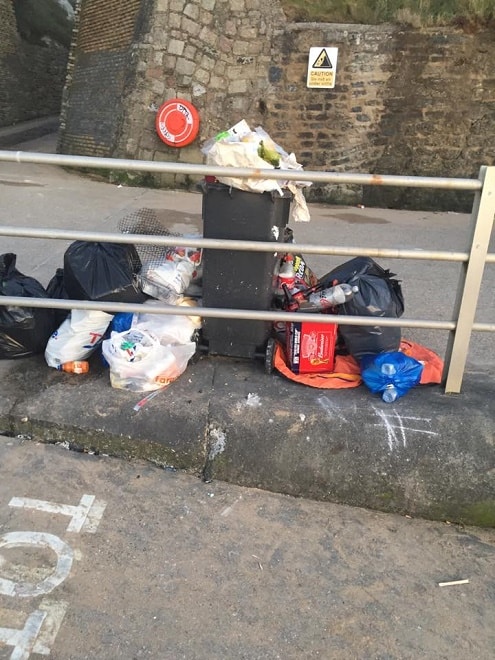
To notice if additional rubbish is laying on the pavement, to notice if a resident’s bin lids need replacing or whether the containers used to collect multiple refuse are proving adequate.
Residents living in the Old Town of Margate have told me that they do not have their own refuse bins, using local business containers instead. And, as for recycling, more than one group of residents told me, that instead of collection, how they must visit a local recycling site which is often overflowing.
Multiple occupancy households in Margate and Cliftonville, deemed as not having enough room outside of their properties for individual bins, share with multiple others. One resident told me that in her block of nine flats only one bin is provided and the building next door, which has 24 flats, they have the same provision.
Invest – Bring in more road sweepers. Invest in additional bins, provide improved recycling areas, provide training for service providers, education for service users.
The future.

There is a lot to be done here, but it is equally clear that Margate and Cliftonville (and the surrounding areas) have a voice, and that this is a voice that is loud and angry and raised in a battle cry.
The people who I communicated with during the completion of this article, made it clear to me that they want to live in a town that they are proud of, a town where they can welcome visitors to, a town where they can set up home.
In recent times, Margate has seen a significant turn in the fortune of its tide, with people moving down in droves from London to take up occupancy in its grand Victorian houses that can be bought for the price of a London bedsit. Yet, to become a real part of Margate, it takes more than just the investment of property, more than the taking in of its waters or in the watching of its magnificent sunsets. It takes a level of investment, the sewing in of oneself into the fibre of its tapestry. Margate needs to be nurture and loved.
I, individually, can use the gift of the written word in a crude attempt to convey what has been told to me. I can use my grit and my determination to make sure that these words reach those who are in a position of power, those who can make a physical, real difference.
I can do this as an individual but as a collective, we can do more.

So, Margate. Whether you live here, plan to, have recently visited or just have fond memories of the town as a child, remember. Remember that this is a land loved by Turner, Elliot and Emin and by me and the countless people that contacted me in the production of this article. In my eyes as well as theirs, Margate is a town that is worthy of investment and care.
No matter where you live, whether on these or foreign shores, I believe that we need to start creating a voice. We need to educate the young and the not so young and to focus on our own individual waste disposal and recycling practices. We need to increase the level of nurture and care that we place in this wonderful planet that we call Earth, and this should not just be focused on where we classify as home but also on the places and countries, such as Greece, that we choose to visit.
I just wonder.
If TS Elliot were to visit Margate at this present time, would his poem ‘The Wasteland’ have contained a different theme?

